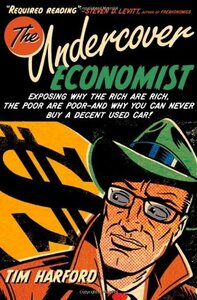Take a photo of a barcode or cover
Thanks to Stephen Donoghue for buying me this. It's a fascinating and enlightening look at economics for the layman. It covers topics such as scarcity, globalisation, why some African countries remain poor and the state of healthcare, amongst other things. Very accessible.
I'm a sucker for this kind of book. Bite-sized insights into why things are the way they are, counter-intuitive (but ultimately very convincing) explanations for everyday phenomena.
really quite enjoyable! harford takes the time to explain each concept slowly, while relating it all to 'common people' things.
Interesting and fun, with a good level of depth for me: neither too advanced nor too introductory. I don't think it would stand up under heavy scrutiny -- there's too much opinion mixed in, and too many things glossed over lightly -- but it was an enjoyable read, and good at kindling interest to delve deeper.
very much not my usual cup of tea, but provided a very interesting insight into economics and how the world works. I'd recommend it to anyone keen for some knowledge!
Rereading it several years later, and with a bit more background in econ, I still find it informational and entertaining, but it highlights some of the frustrations I have with econ: great for revealing insights, a struggle when it comes to applying it to public policy. Sweatshops are better than the alternative, and given time (decades) lead to prosperity, but people are still suffering today, right now, so how do you address that without throwing off the progress over time? (Note: I don't know either! I'm just saying.)
***
Original review:
For me, the standard in "Economics for People Who Hate Economics" books is [b:Freakonomics|1202|Freakonomics A Rogue Economist Explores the Hidden Side of Everything|Steven D. Levitt|http://photo.goodreads.com/books/1327909092s/1202.jpg|5397] by Steven D. Levitt and Stephen J. Dubner, which opened my mind to all the things economists studied besides just GNP and GDP. This is another entry in the field, and I liked it as much or more than Freakonomics.
Harford does a fantastic job of explaining basic economic theory in even more basic terms, using examples like Starbucks, the government of China, and traffic congestion to make his point. He's got a great sense of humor and a good turn of phrase. I still don't feel like I could carry on a conversation about economics, but after this book I feel like I could eavesdrop on one and follow along reasonably well.
Now, can someone find me a book like this that makes statistics seem fun and comprehensible? I would love you forever.
***
Original review:
For me, the standard in "Economics for People Who Hate Economics" books is [b:Freakonomics|1202|Freakonomics A Rogue Economist Explores the Hidden Side of Everything|Steven D. Levitt|http://photo.goodreads.com/books/1327909092s/1202.jpg|5397] by Steven D. Levitt and Stephen J. Dubner, which opened my mind to all the things economists studied besides just GNP and GDP. This is another entry in the field, and I liked it as much or more than Freakonomics.
Harford does a fantastic job of explaining basic economic theory in even more basic terms, using examples like Starbucks, the government of China, and traffic congestion to make his point. He's got a great sense of humor and a good turn of phrase. I still don't feel like I could carry on a conversation about economics, but after this book I feel like I could eavesdrop on one and follow along reasonably well.
Now, can someone find me a book like this that makes statistics seem fun and comprehensible? I would love you forever.
Harford does good work in making economics interesting and accessible in topics ranging from real estate pricing to global income inequality. However, at times, broad pronouncements are made with a tone that suggests their veracity is self-evident, while little in the way of empirical data (or footnotes) are used to backup said claims. The book is a bit dated--most immediately in its coverage of the tech stock market--which also affects its utility, at some level.
Accessible and generally entertaining, but lacks enough depth to be as authoritative as I'd hoped.
Accessible and generally entertaining, but lacks enough depth to be as authoritative as I'd hoped.


